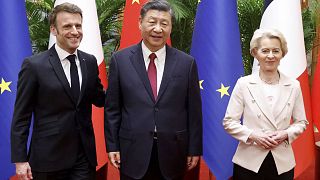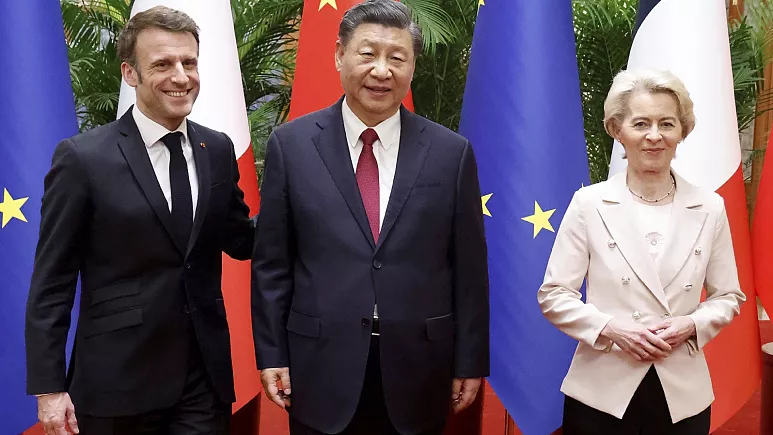China arming Russia would ‘significantly harm’ relationship with EU, von der Leyen warns in Beijing

China’s President Xi Jinping, center, his French counterpart Emmanuel Macron, left, and European Commission President Ursula von der Leyen meet in Beijing, April 6, 2023. – Copyright Ludovic Marin/Pool Photo via AP
Ursula von der Leyen reiterated on Thursday following meetings with President Xi Jinping that China providing military equipment to Russia would “significantly harm” its relationship with the European Union.
“I want to be very clear on that one, that arming the aggressor is a clear violation of international law. It’s the aggressor and he should never be armed. And this would indeed significantly harm the relationship between the European Union and China,” the European Commission President told reporters in Beijing.
Von der Leyen held two meetings with Xi Jinping on Thursday, one held in a trilateral format with French President Emmanuel Macron and a separate one-on-one meeting. She also met with Chinese Premier Li Qiang.
“I did emphasise in our talks today that I stand firmly behind [Ukrainian] President Zelenskyy’s peace plan. I also welcomed some of the principles that have been put forward by China. This is notably the case on the issue of nuclear safety and risk reduction and China’s statement on the unacceptability of nuclear threats or the use of nuclear weapons,” she said afterward.
She also urged Beijing to use its influence to deter Russian President Vladimir Putin from acting on his recent threat to station tactical nuclear weapons in Belarus.
about:blank
“China being a permanent member of the United Nations Security Council has a big responsibility to use its influence in a friendship that is built on decades with Russia. And we count on China to really exert also this responsibility and to be very clear in the messaging,” she said.
She also encouraged President Xi to schedule talks with Zelenskyy. “I know from my phone calls that President Zelenskyy asked for it publicly. So it was interesting to hear that President Xi reiterated his willingness to speak when conditions and time are right. I think this is a positive element.”
The Ukrainian President told Associated Press reporters late last month that he wants to speak with the Chinese leader “because I had contact with him before (the) full-scale war but during all this year, more than one year, I didn’t have.” He also expressed his willingness to welcome him in Kyiv.
‘Bring back China to reason’
In a separate press conference held earlier on Thursday, Macron and Xi had called for peace talks to start as soon as possible, reiterating that nuclear weapons cannot be used and that attacks against civilians and civilian infrastructure, including nuclear power plants were to be avoided at all costs.
“The Russian aggression in Ukraine has dealt a blow to stability. I know I can count on you to bring back Russia to reason and everyone back to the negotiating table,” Macron said to his counterpart.
A topic that was flagrantly avoided by both leaders during their joint statement was Taiwan, despite Beijing sending warships around the island on Thursday following a meeting in Los Angeles between Taiwan’s President Tsai Ing-wen and US House Speaker Kevin McCarthy.
China considers Taiwan a breakaway province and has been ramping up the rhetoric in recent months, sparking fears it could gear up to use military force to forcefully reunite it with the mainland.
Von der Leyen confirmed, when asked by Euronews, that the topic was raised during her meetings with the Chinese leadership.
“We all agree that stability in the Taiwan Strait is of paramount importance. We have a very clear interest in preserving this stability, the peace and the status quo in the Taiwan Strait. And therefore, nobody should unilaterally change the status quo by force in this region.
“The threat to or the use of force to change the status quo is unacceptable. And it is important that some of the tensions that might occur should be resolved through dialogue,” she said.
‘EU becoming more and more vigilant’
The trip by the two European leaders comes just a week after the Commission chief delivered a sobering analysis of EU-China relations describing them as “more distant and more difficult”.
She accused China of using its economic and commercial strength to bully smaller countries, and of using its position to undermine the international rules-based order in a bid “to make China less dependent on the world and the world more dependent on China.”
But she also outlined her belief that the EU cannot and should not aim to cut itself off from China, known as decoupling, which she said on Thursday is not “a viable or desirable strategy”. She instead reiterated her stance that the EU should de-risk from China by addressing imbalances and dependencies.
Last year, China was the third-largest partner for EU exports of goods and the largest partner for EU imports of goods, with trade of more than €2.3 billion per day. But the EU’s trade deficit with China has tripled over the last decade to reach almost €400 billion last year.
“This trajectory is not sustainable and the underlying structural issues need to be addressed,” von der Leyen said Thursday.
Among the issues the EU chief wants to redress are unfair practices European businesses say impede their access to the Chinese market. She listed “increasing pressure to submit technology pressure”, “excessive data requirements”, and “insufficient enforcement of intellectual property rights” among the hurdles EU companies face to do business in China, and that put them at a “significant disadvantage” compared to Chinese companies that have much greater access to the European market.
“So against this backdrop, the European Union is becoming more and more vigilant about protecting our interests and ensuring a level playing field,” she said, calling on the EU to lower dependencies by diversifying trade and investment relations, lowering the risk of “leakage of sensitive technology” through exports controls and investment screenings.
“But whatever the instrument we chose is, we wish to solve the current issues through dialogue. So it’s basically de-risking through diplomacy,” she added, welcoming the agreement to resume high-level economic, trade and digital dialogues.
‘Breathe new life in EU-China relations’
Xi Jiping, meanwhile, said during his joint press conference with Macron that work was underway “to breathe new life into the relationship between China and the EU” by reviving “exchanges, dialogues and cooperation in all fields.”
French companies that accompanied Macron on the trip are walking away with some new deals including Airbus which stuck an agreement to supply 160 aircraft to the China Aviation Supplies Holding Company, while the French agri-food sector was granted fifteen new approvals for the export of French pork.
EDF is walking away with some partnership deals for both civil nuclear energy and offshore wind, and Alstom with an agreement to supply equipment for the Chengdu metro system.


